
Research Highlights
Mental Health Aid for Flood Victims
To help Nebraskans affected by 2019’s devastating floods, the University of Nebraska’s Public Policy Center is collaborating with four of the state’s Behavioral Health Regions and community partners on two mental health initiatives. Stacey Hollman, the center’s senior research manager, helped secure two grants totaling nearly $2 million from the federal Substance Abuse and Mental Health Services Administration.
One focuses on training school employees to address the behavioral health needs of students and families by providing on-site services or referring them to other providers. The second serves adults affected by the disaster who face mental health or substance abuse problems.
Goals are to train people to recognize and respond to adults with behavioral health issues, educate the work-force on disaster-related mental health problems and provide treatment vouchers to people in affected areas. Each grant will reach 23 mostly rural counties.
Nebraska news release: Public Policy Center aids new mental health initiatives
Merging Machine Learning, Genetics
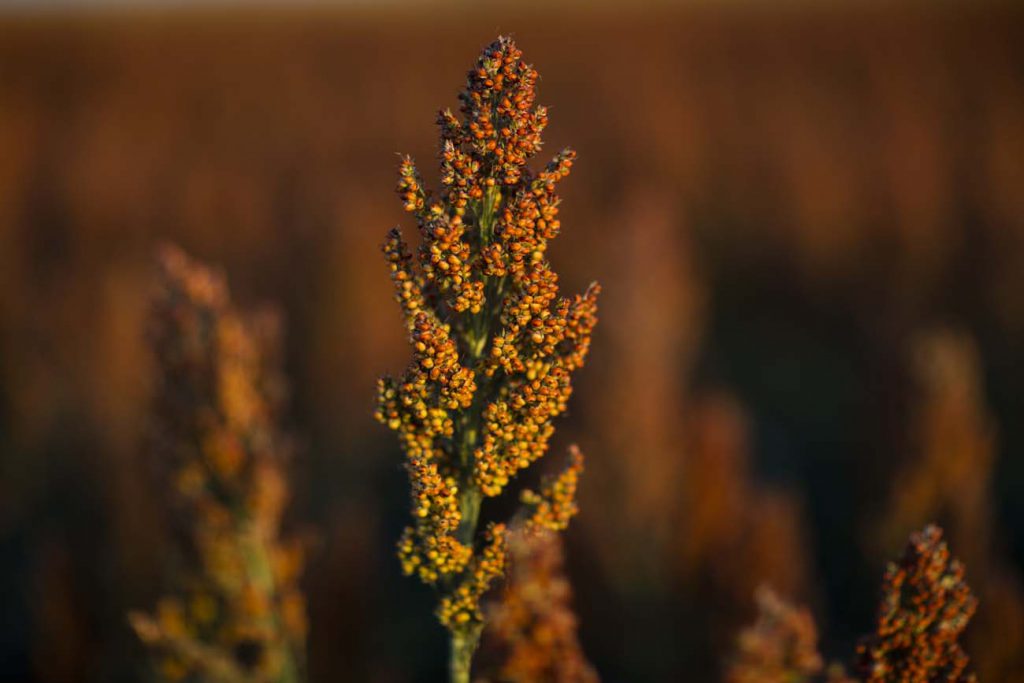
Sorghum has potential to be a star player in the biofuels industry. But without pinpointing the functions of the crop’s roughly 30,000 genes, it’s impossible to develop specialized varieties. With a $2.7 million grant from the U.S. Department of Energy, an interdisciplinary Husker research team is leading a group of Corn Belt-based institutions in developing a rapid, efficient method for identifying sorghum gene functions.
The strategy is based on reverse genetics, where scientists start with a known gene, alter it, then study the resulting plant to shed light on the gene’s function. But because identifying the right genes to study is like finding a needle in a haystack, the team is using artificial intelligence to teach computers to identify key genes.
The team will edit the selected genes and study the resulting plants. Project leader James Schnable, Charles O. Gardner Professor of Agronomy, said the project is among the first to merge machine learning and plant genetics.
Nebraska news release: Nebraska team merges machine learning, plant genetics to maximize sorghum potential
Investigating Cells’ ‘Power Supply’
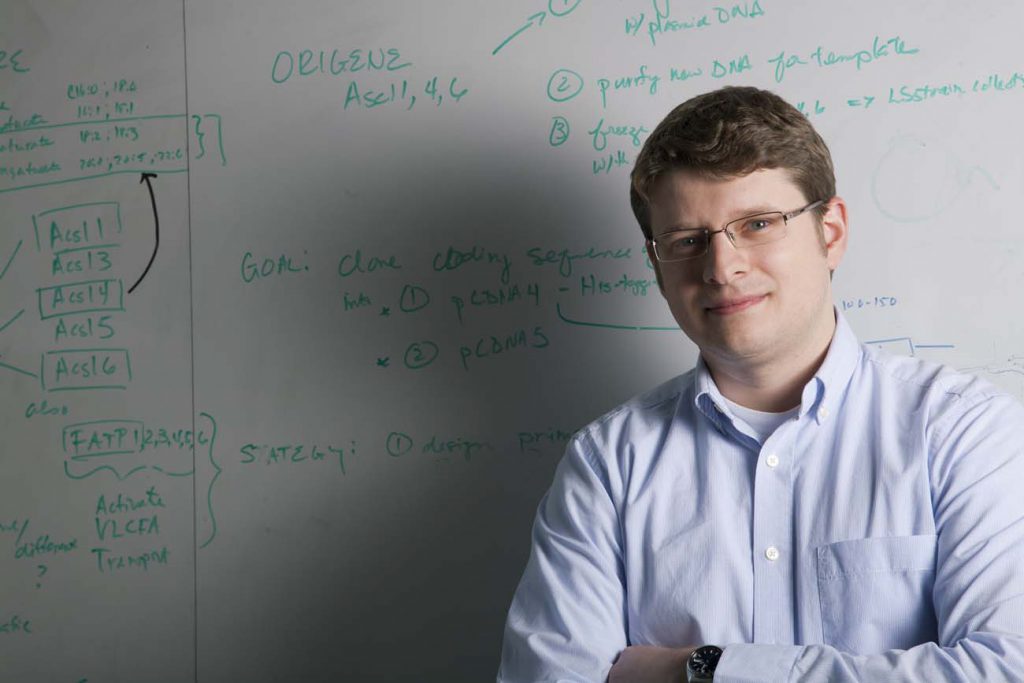
Oleh Khalimonchuk’s investigation into a single protein implicated in amyotrophic lateral sclerosis, or ALS, has morphed into an expansive quest to identify the complex causes of numerous degenerative diseases.
His research could lead to new therapies for ALS, Parkinson’s, Alzheimer’s, other degenerative diseases and some cancers.
Khalimonchuk, the Susan J. Rosowski Professor of Biochemistry, earned a $1.8 million National Institutesof Health Maximizing Investigators’ Research Award, a five-year grant that allows talented researchers to explore promising new directions. He investigates mitochondria, the cell’s power supply centers.
To remain healthy, mitochondria rely on a complex network of proteins and other molecules working together to maintain and repair them. His team studies both the individual roles of a variety of key proteins and how the breakdown of this intricately choreographed quality control system leads to diseases.
Khalimonchuk is a member of the Nebraska Redox Biology Center and the Nebraska Center for Integrated Biomolecular Communication.
Nebraska news release: Nebraska biochemist investigates cells’ ‘power supply’ for disease clues
Kiewit Gift Boosts Engineering Expansion
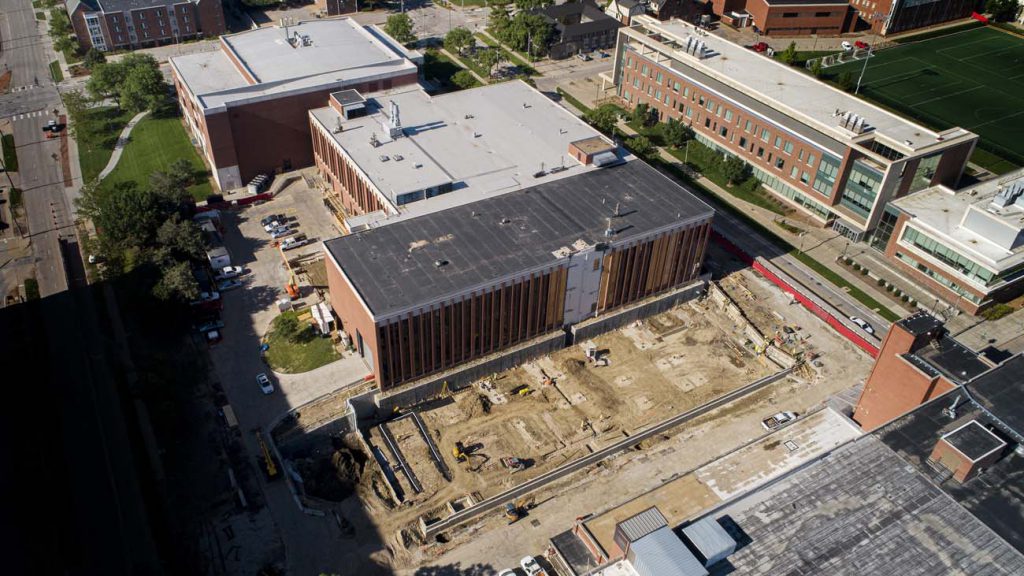
Nebraska Engineering received a substantial gift from Omaha corporation Peter Kiewit Sons’ Inc. to help construct a new facility in Lincoln.
The building, to be named Kiewit Hall, will be the College of Engineering’s academic hub and house its construction management programs.
Kiewit donated $20 million toward the $85 million facility, which is expected to be completed in fall 2023. The Abel family of Lincoln is a second major contributor to the project. Jim Abel, chairman and CEO of NEBCO, and his wife, Mary, are longtime civic leaders and their family’s support for the university goes back three generations. The family has agreed to donate a parcel of land at 17th and Vine streets to the project.
Other major donors contributing to ongoing fundraising include Robert and Joell Brightfelt; Hausmann Construction; Rick and Carol McNeel; Dan and Angie Muhleisen; Olsson; Union Pacific Foundation; and Don Voelte and Nancy Keegan.
The facility is part of a larger multiphase project to significantly renovate and expand the College of Engineering and meet the state’s accelerating need for engineers and computer scientists.
“The college is extremely grateful to Kiewit for this generous gift and continued partnership as we make critical investments to provide Nebraskans with world-class construction, computing and engineering education and research,” said College of Engineering Dean Lance C. Pérez.
Nebraska news release: Kiewit partnership powers Nebraska Engineering forward
Video accompanying Nebraska news release: Engineering expansion marked with ceremony, signatures
Carson Media Arts Center Opens
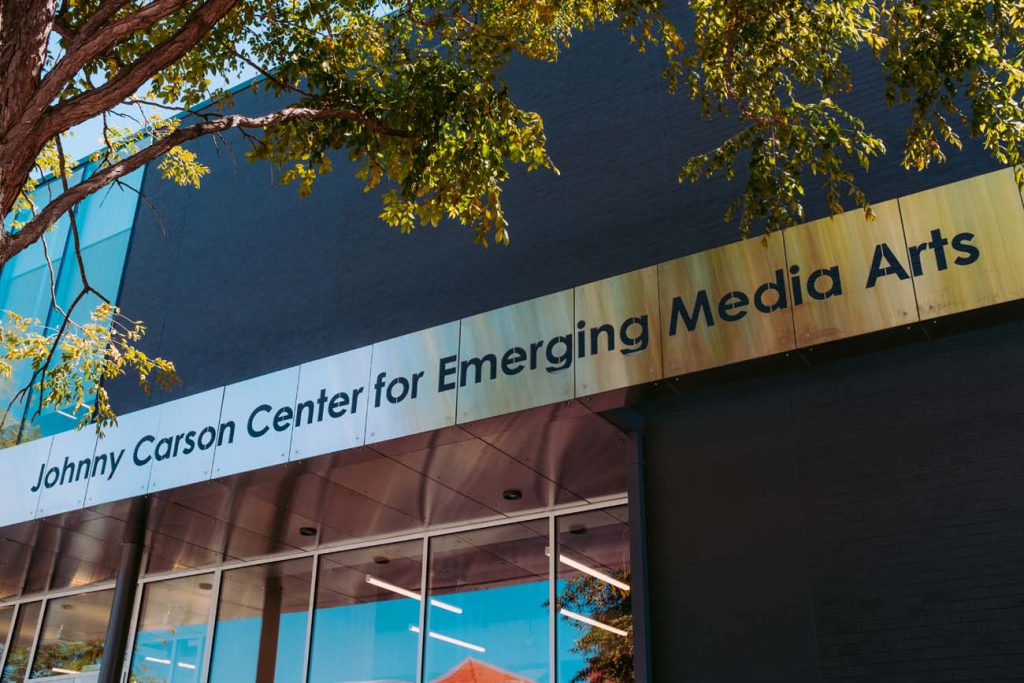
Nebraska’s Johnny Carson Center for Emerging Media Arts opened in August 2019, welcoming a new generation of creative, future-oriented leaders.
Plans for the center, part of the Johnny Carson School of Theatre and Film in the Hixson-Lied College of Fine and Performing Arts, began in 2015 with a $20 million gift from the Johnny Carson Foundation. The iconic talk show host was a Nebraska native.
The center’s curriculum focuses on four cognitive skills needed to thrive in the age of intelligent machines: critical thinking, systems thinking, cultural agility and entrepreneurship. These skills will prepare students for careers in artificial intelligence, game design, virtual reality, data streaming and other fields that go beyond entertainment, said Megan Elliott, the center’s director.
The center was the first program at a Big Ten university to earn a Hewlett Packard/Educause Campus of the Future designation, a partnership that gives Nebraskans access to the latest high-tech equipment.
Nebraska news release: Nebraska’s ‘transformative’ emerging media arts program opens
New Home for CEHS

The former site of Mabel Lee Hall is undergoing a transformation to meet the future needs of students.
Dedicated in 1968 as the Women’s Physical Education Building, the facility was renamed in 1977 and transitioned to a mixed-use space. Now, it’s been demolished to make way for the new home of the College of Education and Human Sciences.
The project, which started in spring 2020, will allow the college to better connect its programs across City and East campuses and add flexibility to meet future student needs. Scheduled to open in summer 2022, the new 126,590-square-foot, four-story building will feature a variety of classroom and office options and link directly to Teachers College Hall.
“The modern, new space will inspire collaboration while elevating our efforts to provide students with innovative and engaging ways to learn,” said Sherri Jones, dean of the college.
Nebraska news release: Mabel Lee demo marks busy summer construction season
Construction plans and updates: College of Education and Human Sciences website
Rediscovering Pioneering Chemist
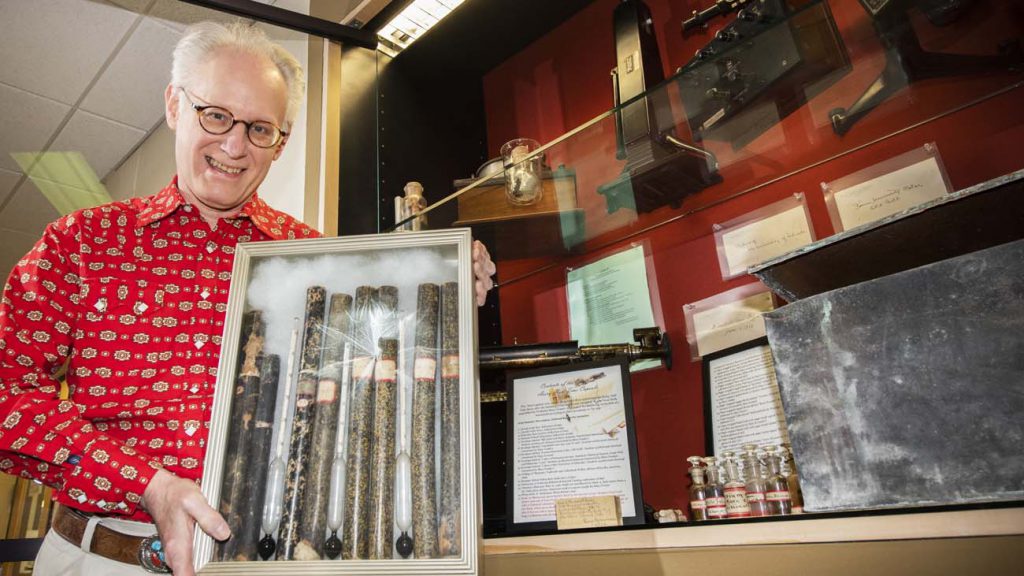
Forgotten for more than a century, Rachel Lloyd and her contri-butions to Nebraska chemistry and agriculture have received well-deserved national recognition, thanks to the efforts of Mark Griep.
Griep, professor of chemistry, received the Champion of History Award from History Nebraska, the state historical society, for bringing Lloyd’s story to light.
Lloyd was the first American woman to earn a doctorate in chemistry. In 1887, she became Nebraska’s second chemistry professor and chaired the department before retiring in 1894. Her research on sugar beets gave Nebraska farmers a new crop and pioneered a new industry, an economic boon for the young state.
Griep has spent more than two decades researching Lloyd’s life and championing her accomplishments. In 2014, his efforts led the American Chemical Society to recognize Lloyd as a National Historic Chemical Landmark. Griep continues to give presentations about Lloyd’s historic contributions to chemistry and the state.
Nebraska news release: Decades of research brings Rachel Lloyd back to the fore
